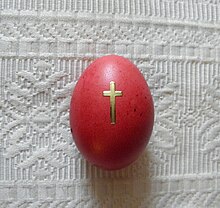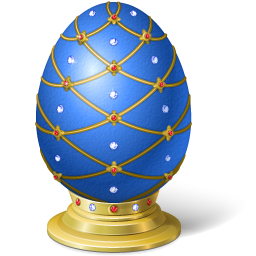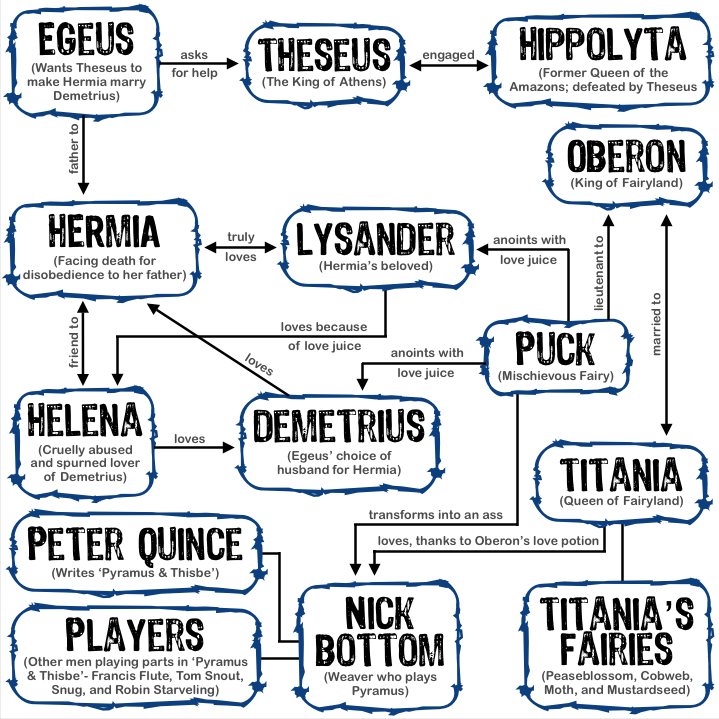0
L'Ultima Cena di Danieleima Cena di Daniele Crespi, Pinacoteca di Brera, Milano
Easter is the time of the Christian year when the Christians remember the Death and Resurection of Jesus. Due to Holly Bible, Jesus is the son of God, and he died for everyone's wrong-doings, and come back to life three days later to defeat death and evil, and those who believe in Him will live forever in Heaven.
The word 'Easter' comes from two old pagan spring festivals. The old European pagan festival of 'Ostara' that celebrated new life and Arabian Sun festival of 'Ishtar'.
The Passover festival dates from about 4,000 years ago when Jewish people remember that God saved them from slavery in Egypt. Jesus was a Jew and so celebrated the Passover. Passover takes place in the first month of the Jewish New Year (14-15 of the month of Nisan). The Jewish calendar follows the cycle of the moon, so the date changes a bit every year.
The date of Easter change every year, because the Church calendar follows the moon, Easter Day can be on any Sunday from March 22nd to April 25th!, and it's always on the first Sunday after the first full moon on 21st or later, but if you wish to know the next Easter days in the future you can find the date out with this https://www.whyeaster.com/customs/dateofeaster.shtml
Easter custom is similar all over the world, and the people usually used the food, animals and others to express their love and respect to this Christian festivity. One of them are Eggs & Chicks, and they are often associated with.
In Pagan times, they were signs of Fertility and New Life. The Early Christians took over the meaning of New Life because it helped them remember the Resurrection and having New Life through Jesus. 

Easter eggs, also called Paschal eggs,[1] are decorated eggs that are usually used as gifts on the occasion of Easter. Easter eggs are common during the season of Easter season. The oldest tradition is to use dyed and painted chicken eggs, chocolate eggs wrapped in colourful foil, plastic eggs filled with confctionary such as chocolate.
In Christianity eggs, in general, are a traditional symbol of fertility and rebirth, Easter eggs simbolize thr empty tomb of Jesus, resurrected. One ancient tradition was the staining of Easter eggs with the colour red "in memory of the blood of Christ, and this custom can be traced to Early Christians of Mesopotamia, than spread into Russia, Siberia through the Orthodox Churches, and later into Europe through the Catholic and Protestant Churches.This Christian use of eggs may have been influenced by practices in "pre-dynastic period in Egypt, as well as amid the early cultures of Mesopotamia and Crete".  Red coloured Easter egg with Christian cross, from the Saint Kosmas Aitolos Greek Orthodox Monastery,
Red coloured Easter egg with Christian cross, from the Saint Kosmas Aitolos Greek Orthodox Monastery,
 Red coloured Easter egg with Christian cross, from the Saint Kosmas Aitolos Greek Orthodox Monastery,
Red coloured Easter egg with Christian cross, from the Saint Kosmas Aitolos Greek Orthodox Monastery, A decorated ostrihttps egg with Punic artwork.
A decorated ostrihttps egg with Punic artwork.
Here I want to mention the goldsmith Faberge and his eggs, are jeweled eggs created of a House of Fabberge and all were manufactured under the supervision of Peter Carl Fabergé between 1885 and 1917... more on Fabberge eggs wikipedia.
In Russia, during the early years of the 20th century, the former Royal rulers Czar Alexander III and Czar Nicholas II had some very special Easter Eggs made for them by the jeweller Carl Fabergé. 

The first egg was a gift from Alexander III to his wife, was made of gold and white enamel. Inside the egg was a golden yolk containing a golden hen with ruby eyes. Inside the hen was a tiny golden crown. The Czarsaid that every Easter, Fabergé should make the Czarina a special egg. The design of the egg was left up to Fabergé, but each egg had to have a surprise in it.
One amazing egg celebrated the opening of the Trans-Siberian railway. It was made of solid silver, with a map of the train route on it. The stations were marked with precious Jewels, and inside was a gold clockwork train!
 Eggs painted boiled in the onions peel
Eggs painted boiled in the onions peel
In some countries, egg hunts take place over Easter. Eggs are hidden around a house or garden and children have to find them. Sometimes they are told that the eggs were hidden by the Easter Hare or Bunny.
Egg rolling races are held all over the world on Easter Monday. Eggs are rolled down a hill or slope and the first one to reach the bottom that hasn't broken is the winner. There is also an egg-knocking game is played in lots of countries including France, Germany, Norway and Syria. The game is played with hard boiled ones and is a bit like the game of 'conkers'. The object of the game is to hit everyone else's egg and to keep your own one unbroken. The last player with a whole egg is declared the winner.
Chocolate Eggs have replaced wooden ones now and are certainly a lot nicer to eat!
 or
or
 Easter dove, the Easter pastry (the counterparty to Panettone for Christmas)., traditional Italian desert.
Easter dove, the Easter pastry (the counterparty to Panettone for Christmas)., traditional Italian desert.
and finaly our meals and sweetes for the Easter holiday, where the recipies are similar in their elementary ingredients and than have "one hundred" addings called the secret of the Cheff.
ingredients.
http://www.bpw.hr/attachments/article/300/Krostula-recept.pdf by Dragica Lukin

With dear friend from Palermo, Sicily (forum http://isolacreativa.forumfree.it/), I had a nice Easter Swap, so with these images I wish to all folower and visitors and non a Happy Easter. Thanks dear Rosa. http://ilfilochecrea.blogspot.it/
 |
Happy Easter |










 Silent Night, Holly Night.
Silent Night, Holly Night.  It portrays the events surrounding the marriage of
It portrays the events surrounding the marriage of 










